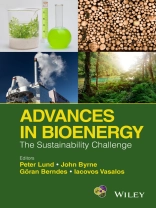The increasing deployment of bioenergy frequently raises issues regarding the use of land and raw materials, infrastructure and logistics. In light of these sometimes conflicting interests Advances in Bioenergy provides an objective and wide-ranging overview of the technology, economics and policy of bioenergy.
Offering an authoritative multidisciplinary summary of the opportunities and challenges associated with bioenergy utilization, with international researchers give up-to-date and detailed information on key issues for biomass production and conversion to energy.
Key features:
*Discusses different bioenergy uses such as transportation fuels, electricity and heat production.
*Assesses emerging fields such as bio-based chemicals and bio-refineries.
*Debates conditions for the mobilization of sustainable bioenergy supply chains and outlines governance systems to support this mobilization.
* Dedicated chapters to sustainability governance and emerging tools such as certification systems and standards supporting growth of a sustainable bioenergy industry.
*Considers the political, environmental, social and cultural context related to the demand for energy resources, the impact of this demand on the world around us, and the choices and behaviours of consumers.
This book will be a vital reference to engineers, researchers and students that need an accessible overview of the bioenergy area. It will also be of high value for politicians, policymakers and industry leaders that need to stay up to date with the state-of-the-art science and technology in this area.
Зміст
About the editors
List of contributors
Preface
I. Promising Innovation in Biomass Conversion
1. WENE-5 Metabolic engineering: Enabling technology for biofuels production
2. WENE-49 Hydrolysis and fermentation for cellulosic ethanol production
3. WENE-29 Lipid-based liquid biofuels from autotrophic microalgae: energetic and environmental performance
4. WENE-16 Catalytic pyrolysis of biomass for transportation fuels
5. WENE-119 Integrated biomass hydropyrolysis and hydrotreating: a brief review
6. WENE-74 Transportation fuels from biomass via fast pyrolysis and hydroprocessing
7. WENE-97 Biomass gasification for synthesis gas production and applications of the syngas
8. WENE-111 Hydrogen generation from biomass materials: challenges and opportunities
9. WENE-93 Production of renewable hydrogen by reformation of biofuels
10. WENE-69 Fischer-Tropsch conversion of biomass derived synthetic gas to liquids
11. WENE-28 Critical factors for high temperature processing of biomass from agriculture and energy crops to biofuels and bioenergy
12. WENE-59 Second-generation biofuels: why they are taking so long
13. WENE-73 Separation technologies for current and future biorefineries–status and potential of membrane-based separation
14. WENE-361 Catalysis at room temperature: perspectives for future Green Chemical processes
15. WENE-100 Co-firing of biomass with coal in thermal power plants: technology schemes, impacts and future perspectives
II. Challenges and solutions for biomass supply
16. WENE-41 Bioenergy and land use change – state of the art
17. WENE-24 Forest energy procurement: state of the art in Finland and Sweden
18. WENE-25 Options for increasing biomass output from long rotation forestry
19. WENE-157 Recovery rate of harvest residues for bioenergy in boreal and temperate forests: A review
20. WENE-26 Forest Bioenergy Feedstock Harvesting Effects on Water Supply
21. WENE-77 Best management practices for forest bioenergy programs
22. WENE-3 Principles of nutrient management for sustainable forest bioenergy production
23. WENE-88 Crop coefficients of Jatropha (Jatropha curcas) and Pongamia (Pongamia pinnata) using water balance approach
24. WENE-87 Brazilian sugarcane ethanol: developments so far and challenges for the future
25. WENE-17 The climate benefit of Swedish ethanol: present and prospective performance
26. WENE-107 Performance of small-scale straw-to-heat supply chains in Norway
27. WENE-84 Transport sector in Ireland: can 2020 national policy targets drive indigenous biofuel production to success?
28. WENE-138 Prospects for domestic biofuels for transport in Sweden 2030 based on current production and future plans
29. WENE-55 Land and the food-fuel competition: insights from modeling
30. WENE-155 The impact of biofuel demand on agricultural commodity prices: a systematic review
31. WENE-118 How do sustainability standards consider biodiversity?
32. WENE-166 A global survey of stakeholder views and experiences for systems needed to effectively and efficiently govern sustainability of bioenergy
Index
Про автора
Professor Peter Lund
Research interests: Energy systems and innovations. Science, technology, business and policy issues related to large-scale schemes of new and renewable energy; nanotechnology for energy applications; solar cells and fuel cells; distributed energy generation systems; sustainable energy for urban areas; energy system modelling; commercialization and innovation strategies; green energy economy; market penetration and technology diffusion.
Professor John Byrne
Director of the Center for Energy and Environmental Policy (CEEP) and Distinguished Professor of Energy and Climate Policy at the University of Delaware. He has contributed to Working Group III of the United Nations-sponsored Intergovernmental Panel on Climate Change (IPCC) since 1992 and shares the 2007 Nobel Peace Prize with the Panel’s authors and review editors. He is chairman of the board of the Foundation for Renewable Energy and Environment (FREE), an international organization established to promote a better future based on energy, water and materials conservation, renewable energy use, environmental resilience, and sustainable livelihoods.












